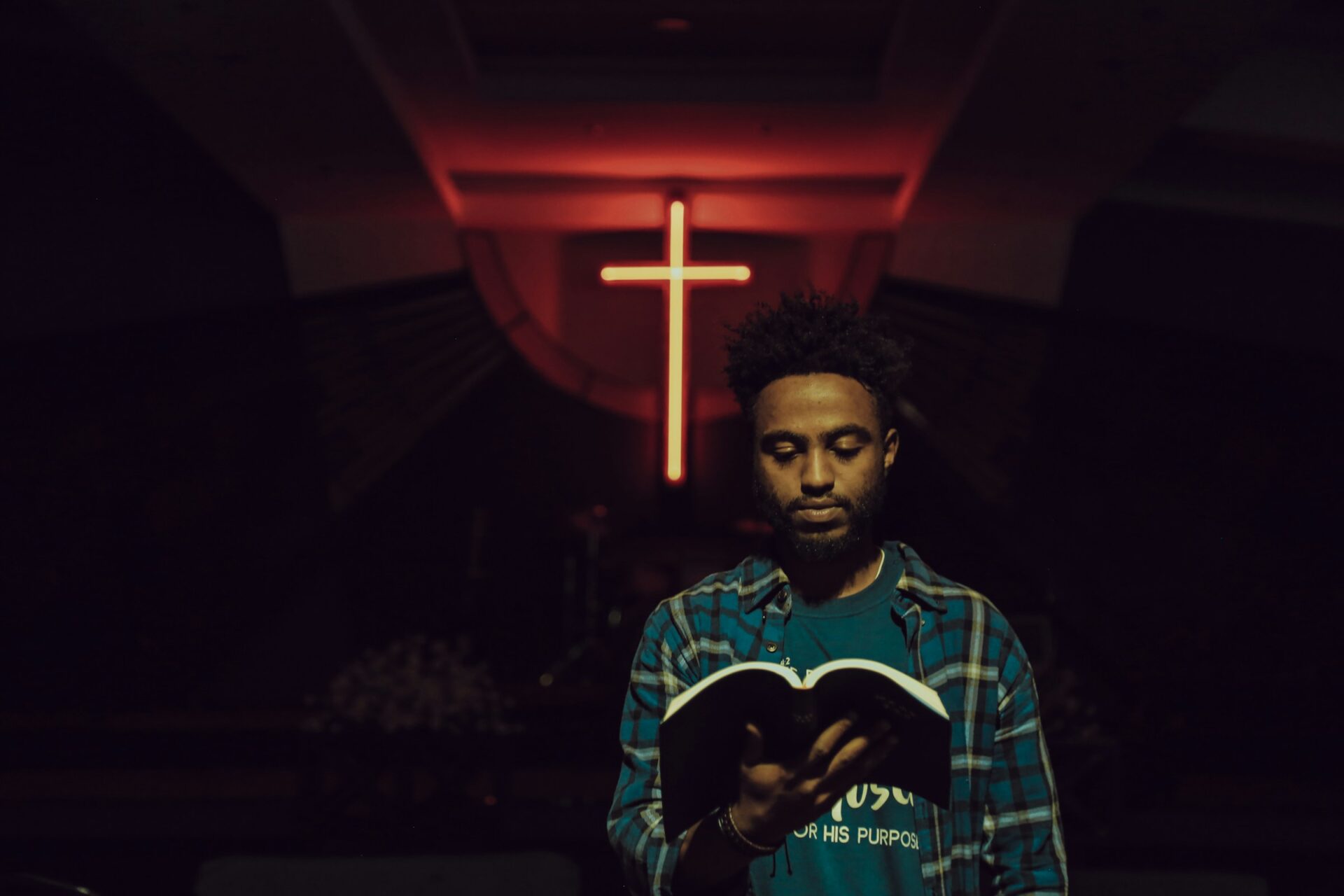
Photograph by Gift Habeshaw via Unsplash
Review of “A Darkly Radiant Vision,” by Gary Dorrien
Historian Gary Dorrien’s A Darkly Radiant Vision: The Black Social Gospel in the Shadow of MLK (Yale Univ. Press, 2023) concludes his survey of the development of the Black social gospel. Dorrien, longtime faculty at New York City’s Union Seminary, builds on his prior work The New Abolition (2015) and Breaking White Supremacy (2018), which guided readers from the latter 19th century to the Civil Rights era. In his writing here (and in an earlier trilogy on the growth of theological liberalism from 1805 to 2005, published with Westminster/John Knox Press from 2001 to 2006), Dorrien raises up the leading voices of key figures like W.E.B. Du Bois and Dr. Martin Luther King, Jr., yet he contextualizes the more famed alongside the many, many others who were working within their time to counteract racism and be a witness for the Gospel in their day.
Dorrien’s work is equally astonishing in scope and dedication as he works to bring theological voices and movements to fuller appreciation for their contributions to what he terms the overall “Black social gospel.” Like the white social gospel (synonymous for many American Baptists with the work and legacy of Walter Rauschenbusch), the Black social gospel “was fundamentally a movement, not a doctrine, featuring a social ethical understanding of the Christian faith” (Dorrien, p. 3).
Yet, with the realities of racism and segregation defining U.S. history (American religious history not excepted and more often deeply complicit or accommodating), the Black social gospel has far more “formative opposition to racism and giving its highest priority to racial justice activism. The vaunted democratic progress of the Progressive Era was worthless if it did not break the chains of racial caste” (ibid.).
For the euphoria sometimes felt in social gospel retrospectives of churches and minds more aware of the need to connect Gospel with social action, the indictment of white social gospel remains: not enough and often too unaware of its relative comfort on the other side of the “color line” defining much of America’s past and present. Indeed, dedicated readers of Dorrien’s earlier trilogy on theological liberalism must read this newer project, if they are to have a more honest understanding of the 19th century to present and the theological, ethical, social, political, and ecclesial challenges brought by the Black social gospel, running parallel in some ways to the work of white liberal or Progressive voices. Those white liberal readers given to such sentiments must embrace the indictments as much as the resonances that occur between the two strands of social gospel theology.
This third volume traces the varied voices rising within academia, politics, and within Protestant denominational traditions, pressing forward after the assassination of Dr. Martin Luther King, Jr., and broadening the conversations about Black theology and social ethics beyond the frameworks the next generation of scholars, pastors and politically engaged leaders inherited from the eras before. After the 1970s, Black social gospel proponents would rise in political prominence (Atlanta’s Rep. John Lewis, Ambassador Andrew Young, and Senator and Rev. Dr. Raphael Warnock alongside Chicago’s Rev. Jesse Jackson, Sr., and the two-term 44th President of the United States, Barack Hussein Obama). Rep. Shirley Chisholm’s run for President in 1972 and the current Vice Presidency of Kamala Harris are part of that history, yet even more remarkable due to the steeper path forward for African American women who have worked doubly hard against white and Black sexism and white feminism defining standards for church and society that have led to the counter-witness of Womanist and Black feminist critiques.
Historian Gary Dorrien’s work is equally astonishing in scope and dedication as he works to bring theological voices and movements to fuller appreciation for their contributions to what he terms the overall “Black social gospel.”
In this “post-MLK” era, one might be tempted to cite the work of the late James H. Cone (a longtime colleague and friend of Dorrien at Union Seminary) as the seminal figure that should adorn this volume as the prior books featured Du Bois and MLK. With his work in Black liberation theology, Cone’s career was tone-setting for many while he learned to understand and engage his critics. Cone spent his first years in academia, writing in search of more systematic thought and engaging the white theological/Western European academy’s frameworks. He would move into later engagements with Black cultural identity (his book The Spirituals and the Blues, Orbis Books, 1972, for example) and critiquing the era that shaped him (his latter work Martin, Malcolm, and America: A Dream or a Nightmare, Orbis Books, 1991). Through Cone’s corpus, we see much that continues to inform and challenge, even as his thought needed the Womanist critique, among others. His faculty colleague Delores S. Williams authored Sisters in the Wilderness (which remains one of my personal favorite books from seminary coursework) providing an example of the counterbalance Cone’s work needed.
Dorrien discusses the political rise of Ambassador Andrew Young and the Rev. Jesse Jackson, Sr., two Civil Rights era veterans among those who gained political prominence and heightened national and international profiles. Both steeped in the Black social gospel, the two led very public careers, leveraging opportunities, and calling out systems that perpetuated the racist undertow of American history. Dorrien does not shy from showing the clay feet of any of his subjects, here highlighting gaffes and shortcomings Young and Jackson made in their careers. The “rainbow politics” advocated by Jackson continues to resonate in parts of American politics, a measure of honesty America still struggles to embody.
Other chapters trace the emergence of theological voices in the academic world. The brilliance of Cone, Samuel DeWitt Proctor, J. Deotis Roberts, Kelly Brown Douglas, Katie Geneva Cannon, Delores S. Williams, and Emilie Townes are highlighted among the many contributors to Black liberation theology, Womanist and Black feminist theology, and other strands emerging from the theological critiques of scholars engaging not abstract dogma but the demands of justice for systemic racism and our broken-down society.
The more “prophetic fire” strand of Black social gospel (post-1960s) is addressed well by Dorrien’s survey of Cornel West, Eugene Rivers, Traci West, and bell hooks, among others. The activist work of William J. Barber II and Traci Blackmon raises the need for a Third Reconstruction, addressing the failure of the post-Civil War era and the unfinished work of the Civil Rights era. Dorrien critiques the need for a Third Reconstruction, especially considering the achievements yet shortcomings of the Obama presidency, whose early days were marked by wistful sentiments we were becoming a post-racial society, versus what actually ensued. The public policy progress that was made was mired down in frequent legislative battles. Acts of outright racially motivated brutality persisted (i.e., the 2012 shooting of Trayvon Martin and the 2015 massacre of nine persons at Mother Emanuel AME in Charleston, SC.)
Dorrien does share from time to time of his personal friendships and encounters with many of his subjects. He was quite close to James Cone. He taught Raphael Warnock, among others, at Union Seminary. As a historian, he cites these “close at hand” moments in his career where he has experienced firsthand being part of advocating for a candidate (Jesse Jackson’s run) or encounters with his counterparts in conversation where they diverged in opinion about the issues they faced. All of Dorrien’s books are graced by splendid endnotes, guiding the reader to a wealth of primary and secondary sources for further reading.
Sometimes, I have the feeling, as a reader, that a confessional moment is at hand, as he also works through the grief of remembering friends and colleagues who have passed on. His careful work to contextualize various voices and help their moment in time come to fuller understanding by future generations is a fine testament to Black social gospel voices past and present, and a valuable resource for those yet to come.
The Rev. Jerrod H. Hugenot serves as the Associate Executive Minister for the American Baptist Churches of New York State. He received a copy of this book from the publisher for review purposes.
The views expressed are those of the author and not necessarily those of American Baptist Home Mission Societies.



